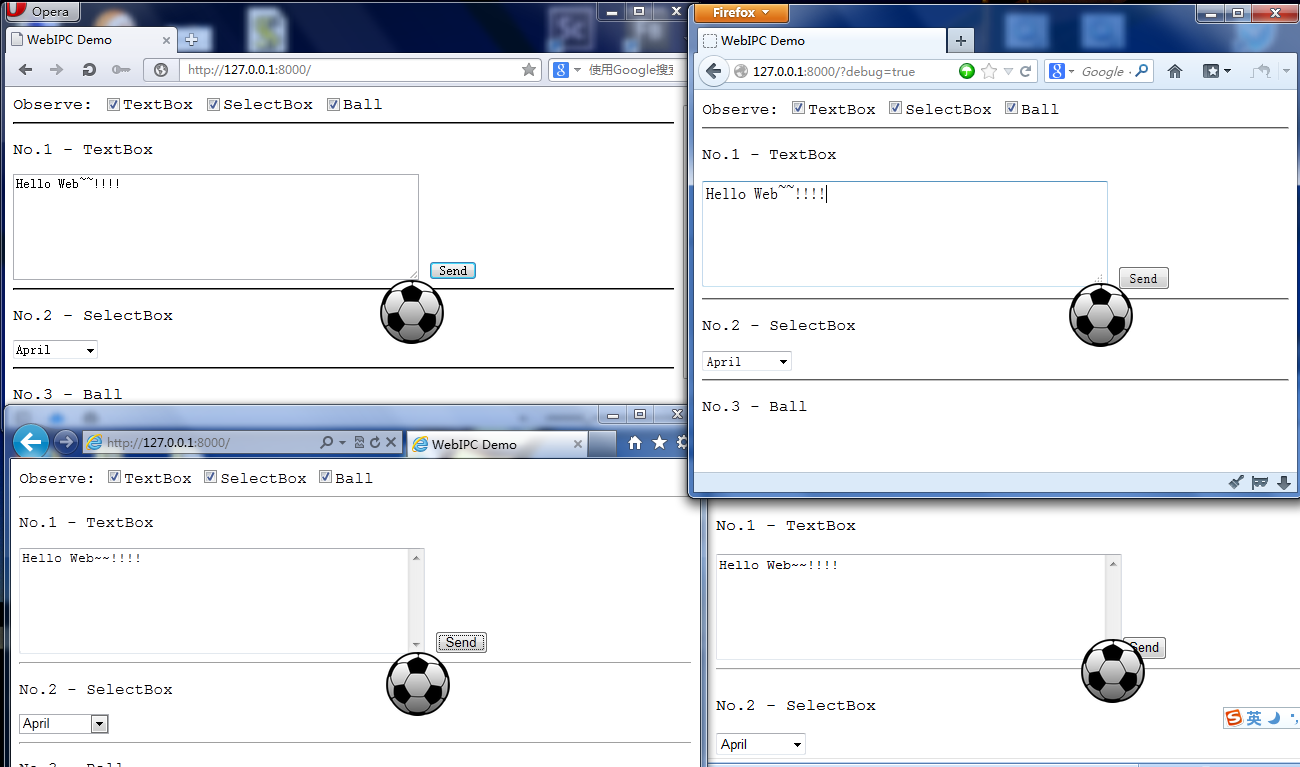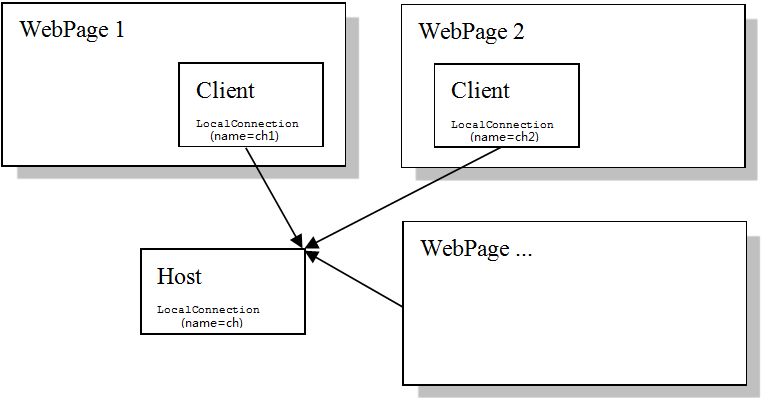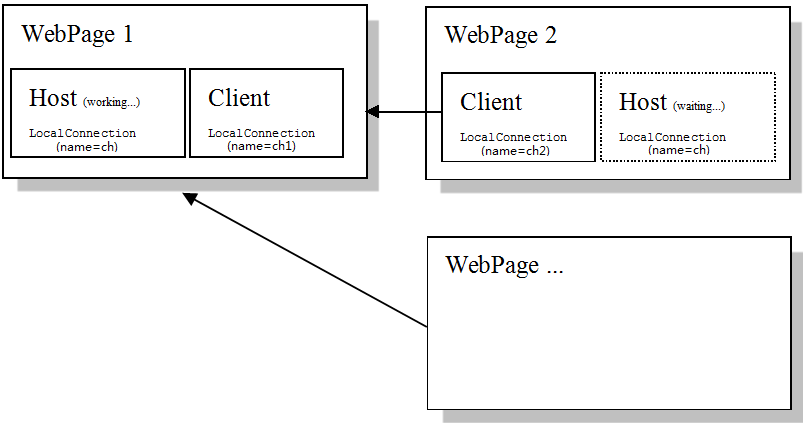Home >Web Front-end >JS Tutorial >Web cross-browser process communication (Web cross-domain)_javascript skills
Web cross-browser process communication (Web cross-domain)_javascript skills
- WBOYWBOYWBOYWBOYWBOYWBOYWBOYWBOYWBOYWBOYWBOYWBOYWBOriginal
- 2016-05-16 17:36:321617browse
在之前一篇文章里尝试了跨浏览器的数据共享,最后提到使用LocalConnection还可以实现跨浏览器消息交互的可行性。
花了两个晚上简略的研究了下,LocalConnection的单向通信非常的简单,不过要实现多个终端交互,必须自己实现一套消息机制,见智见仁了。
为了简单演示,本例使用了基于广播的观察者模式:每个终端可以订阅自己感兴趣的主题,也可以向广播发送消息,通知其他感兴趣的终端。
Demo: http://www.etherdream.com/FunnyScript/WebIPC/ (多开几个浏览器页面小窗口,即可测试)
比较遗憾的是最新版的Chrome浏览器仍然无法和其他浏览器进程交互:(
如果没有错误发生,应该就是如下的效果:

在任何一个页面上的操作,都会立即同步到其他页面里,只要Observe了感兴趣的主题。
为什么要使用观察者模式呢?因为跨进程的通信是比较耗资源的,所以不感兴趣的消息可以直接不订阅,而不是收到再放弃。
LocalConnection是为单一的通信设计的,虽然使用很简单,但可用的接口少之又少。想直接用它来广播事件,或者消息路由,门都没有。
因此底层的消息发送上没有太多可选余地,只能简单的点对点发送。我们必须创建多个LocalConnection,来实现消息的汇聚和分发。
LocalConnection真正能用的只有两个方法:
connect(name) —— 创建管道(每个LocalConnection只能创建一个管道,每个管道名只能有一个)
send(name, ...) —— 向管道发送数据
如果只有两个终端通信,那么一切都是那么简单。。。

只需简单的将消息发送给对方即可。
不过有多个终端情况就大不相同了。由于我们是本地进程间通信,并没有第三方服务器主持,加上LocalConnection只能点对点的发送消息。意味着每次广播都要给其他所有的终端都发送一次,这样复杂度就大大增加了。
为了简化结构,我们模拟一个LocalConnection作为Host,在第一次启动时运行。其余的作为Client,每次广播消息都提交给Host,由它来调度。

Host维护着一个回调列表。当Client对某个主题(subject)感兴趣时,可以发送<主题ID,自己的管道名>给Host来订阅。于是Host就把此Client的管道名添加到该主题的回调列表里。以后若有该主题的消息,即可根据回调列表通知订阅的Client。
为了能让Host和Client通信更简单,这里使用channel+ID的命名规则,来创建管道名。
Host的ID为空,于是Client发送数据只需send(channel)即可;
Client的ID从1~100,选一个没用被占用的作为管道名。Host回调时只需send(channel+id)就能通知对应的Client。
然而,这个Host服务仅仅是假象的。我们根本没法在页面之外运行一个第三方服务,一切只能在页面中实现!于是我们把第一次启动的页面作为Host。当这个页面关闭时,我们再通知第二个页面创建Host,以此类推。。。

由于没有第三方服务器,每个Client都可以兼职做Host。到这里,你是不是想到了局域网游戏?由于没有服务器,第一个创建的玩家便是主机。当他退出时,主机就交给了第二个玩家。如果他没按正常步骤,强制退出了游戏,那就很有可以造成主机丢失,数据没来得及转移给下个玩家,导致游戏断线结束。
Similarly, when the page where our Host is located is closed, an exit message will be sent to all Clients. As for who inherits the throne, don’t worry, whoever knows first will do it~~ The only thing worth noting is that many browsers cannot trigger the window.unload event normally, which unexpectedly means that the Host may not have time to hand over the callback list to his successor. He left in a hurry, so future generations could not take over. In order to prevent this situation from happening, whenever a new Host takes office, a request is sent to all Clients, asking everyone to resend the topics they are concerned about (all the previous ones are saved, just for this time) ). Therefore, even if the new Host has nothing, everyone will tell him the current situation and he can get to work immediately.
If the page process where the Host is located is forcibly closed, everything will hang after the host is lost. At this time, all the data sent by the Client will never be returned. Only when the data transmission fails later will it be known that the Host has hung up. At this time, whoever discovers this error first will take over the Host work.
Of course, you can also consider adding a heartbeat mechanism. Even if the Host does not hang up, but its process occupies the CPU for a long time, causing LocalConnection to be unable to respond to message events, you can also consider transferring the Host.
Due to time constraints, there are still many bugs in this example, which will be gradually improved in the future.
If you want to see the code, you can browse: http://code.google.com/p/webipc/source/browse/
In fact, pure local communication does not make much sense. It is more meaningful only to cooperate with remote services to interact with messages. For example, if a user opens multiple Weibo pages, the traditional model must initiate a long connection for each page to maintain real-time data reception. If you use cross-browser communication, you only need to let the Host initiate a connection, and the other Clients subscribe to the topics they want, and ultimately only one connection is needed.
Related articles
See more- An in-depth analysis of the Bootstrap list group component
- Detailed explanation of JavaScript function currying
- Complete example of JS password generation and strength detection (with demo source code download)
- Angularjs integrates WeChat UI (weui)
- How to quickly switch between Traditional Chinese and Simplified Chinese with JavaScript and the trick for websites to support switching between Simplified and Traditional Chinese_javascript skills

